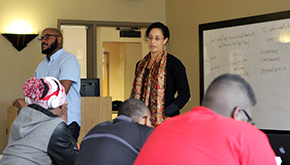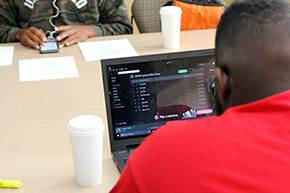It’s impossible to escape the beats. As the classroom door opens, music pours from the speakers in that familiar 4/4 time with a pulsating bass line and the perfect rhyme to match.
Heads bob, the music draws knowing smiles, and a quick glance around the room tells you that these 19 guys are plugged in to what’s going on, not because it’s a distraction to the subject at hand, but specifically because it is the subject at hand.
Assistant Professor of History Sabrina Thomas and Assistant Visiting Professor of English Nathaniel Marshall co-teach HIS 240: The History and Politics of Hip Hop, a class that examines the movement and its cultural, social, and political history, using vehicles like music, dance, visual art, performance, and protest to explore its aesthetic and political foundations.
 When the music pauses briefly as class begins, the first order of business is citations. While hip-hop might be intimately familiar to every member of class, when writing for class – even a hip-hop class – Wabash always cites.
When the music pauses briefly as class begins, the first order of business is citations. While hip-hop might be intimately familiar to every member of class, when writing for class – even a hip-hop class – Wabash always cites.
“When you talk about music, you still need to cite,” Marshall explains. “You should be taking notes. If you articulate a notion, follow it through.”
As the music returned, the conversation shifted to breaks, bars, meters, onomatopoeia, and lines of poetry as a preface before diving into deeper discussions about the music that included women, objectionable language, whiteness, geography, crime, cultural references, and changes across time.
Based on the quality of exchange, it’s obvious that these guys come prepared, because they have to be. It’s not simply about sharing playlists, this class features two required and four supplemental texts, a variety of films to watch, and music to listen to for every class.
“This is a history class, first and foremost,” says Thomas, “and not something based solely on individual experiences. We wanted this to be analytical and creative, as well as a legitimate area of study. We may have overwhelmed them at times, but they are definitely engaged.”
It’s seen in the way students connect lyrics and meaning, while also linking to what’s going on in the world around them.
“I thought it would be a different take on the subject, to learn the history about something I enjoy,” says Jaleel Grandberry ’19. “I like the content of the things we’ve been reading, watching, and listening to and the take on it has been really good. It’s been a lot of work, but it’s a nice and different spin to education.”
The class also experienced a two-day trip to Chicago, where the group was immersed in the Windy City brand of hip-hop, exposed to all its facets. The visit included presentations and Q&A sessions with dancers and rap artists, an introduction to Chicago’s artistic and political climate, and a neighborhood graffiti tour. The group also saw, “How We Got On,” a stylish and bombastic play written by Idris Goodwin about young people in search of their voice.
Added together, these experiences have served as a bit of a reality check.
“I only knew hip hop from what I listened to, not what I researched,” says Darrien Dartis ’18. “Now that I’ve learned the historical background of the culture, it’s more than just a cool song on the radio, it’s how impactful hip-hop culture has been on America. To some, it might only be a musical genre, but it’s really an influential movement of politics, rhythm, and music. It’s a whole bunch of different things.”
Much like the themes in “How We Got On,” this racially diverse group of students is leaning on each other through elements essential to hip-hop, like Each One, Teach One (the idea of actively sharing your knowledge with someone else), to find their own voice. One of the assignments brought them full circle during a stop at Chicago’s Haven Studio. Each student was asked to write his own rhyme and share it with the group accompanied by a beat.
 In many ways, this class exemplifies the spirit-body-voice ethos that permeates hip-hop culture in that it both challenges and supports these students along their journey to be more thoughtful, more aware, and more willing to share in the experience.
In many ways, this class exemplifies the spirit-body-voice ethos that permeates hip-hop culture in that it both challenges and supports these students along their journey to be more thoughtful, more aware, and more willing to share in the experience.
“It’s fun and interesting to challenge whether they feel comfortable with it,” Marshall says. “You are a fan of music, but that doesn’t advance your thinking. I want them to slow down and take a second look. I ask, ‘is that what you’re hearing?’ The hope is to broaden the experience. When you move out of this space – whether it be a chemistry, religion, or classics class – I ask ‘how can I cultivate skills for the things that move me?’ That’s where life happens.”